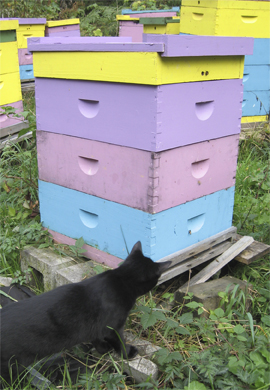Honey from our own hives near Maple Falls
Unfiltered, Unheated Raw Honey
From Naturally Treated, Antibiotic-Free Hives
Mountain Wildflower Raw Honey
(Mount Baker Foothills)
This year’s harvest is a light, delicate honey which the bees created from the blooms of fireweed, snowberry, thistle, and a touch of blackberry. Honey from earlier in the season was eaten by the bees as they waited out the months of rain. The bees fly from naturally treated, antibiotic-free hives.
Sharing their mountain farm with wildlife is important to beekeeper Karen Bean. Her land is home to creatures which range from bears and cougars to opossums and mice. No predator has ever been harmed or killed any predator, except mice. “The livestock guard dog protects the goats and bee hives from the bears and mid-sized predators, but the ‘bee guard cat’ can’t always keep up with the mice,” Bean sighs. She keeps mouse guards on her hives year round.
Brookfield Farm began as a fiber farm nearly 20 years ago when Karen and her now deceased husband, Ian, moved to Maple Falls. In 2003 she was introduced to beekeeping and acquired two hives of Russian bees. “I fell in love with the bees,” she explains. “Beekeeping is science and nature and art and just plain luck all rolled together. And you don’t have to muck out the barn.”
Today Karen averages 40 hives “Beekeeping’s a challenge, that’s what makes it fun,” she says. “For me, one of the most fascinating things about beekeeping is how the bees adapt to their constantly changing environment, be it reduction of egg-laying when there’s no nectar or the ‘I’m not dead yet’ scenes as the girls heave the drones out the door as winter approaches.”
Karen has expanded her apiary primarily through splits (creating a new hive by using eggs, brood, and nurse bees from a parent hive). She allows the majority of her hives to raise their own queens. New queens are also purchased to expand the genetic stock in the bee yard. The surviving hives requeen themselves through open mating. “My goal,” Karen says,” is to have bees that are adapted to the cold, wet environment here near Mt. Baker, and can survive diseases and parasites without the use of chemicals and antibiotics.”



Pingback: Made in Bellingham: Your Guide to Locally Made Food Products - Exploring Bellingham - Exploring Bellingham